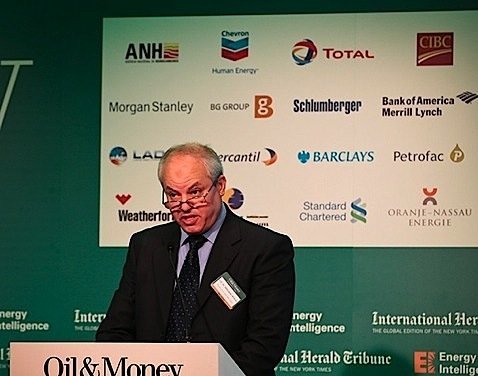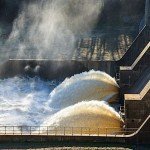Former cabinet minister Jim Prentice, now vice-chairman of CIBC, told the Oil and Money 2013 Conference in London, England that the energy industry in Canada is “at a crossroads,” and that we have our complacency to blame. For years we were “comfortable” with trading mainly with the United States, never believing that that country would ever become energy independent. And now, even as energy production in the US surges, Canada has made “minimal progress” in dealing with its problem.

In his speech to the Oil and Money Conference, Prentice identified access to markets as the biggest challenge facing Canada. While traditionally Canada has relied on the United States to buy “almost all” of its oil and gas, that relationship is changing dramatically and quickly. The US will remain Canada’s most important customer, but Canada has to change its thinking, Prentice said, “to match up its energy resources with the needs of the growth markets of the Asia-Pacific.”
To do this, Canada has to “become more international in its ambitions” and secure trading relationships with new partners, especially Asia-Pacific ones. And it must invest in the infrastructure to export oil and gas “both on the continent and around the world.” And it must make itself attractive to foreign investment, “including from State-Owned Enterprises.”
Compounding that problem of market diversity, direct foreign investment in the energy sector is down by 92 per cent so far this year, compared to last year. The energy sector has received just $2 billion in foreign investment to date in 2013, compared to $27 billion at the same time last year. Merger and acquisition activity is likewise down drastically, from $66 billion last year to $8 billion to date this year.
Foreign investment in energy is essential for Canada. On average, 26 per cent of all capital invested in the sector in Canada over the past five years has been foreign in origin. Without it, the Canadian energy sector could not grow. “Simply stated, our ambitions and resources exceed our supply of domestic capital,” Prentice said.
But when it comes to energy, Canada is not being sufficiently attentive to its future interests. Despite what some may think, it’s not as simple as getting oil to the Pacific coast and onto a tanker. It’s a fiercely competitive world out there. Relationships need to be developed. Negotiations need to be pursued and concluded. An energy trade agenda needs to be advanced.
Jim Prentice
Prentice suggested that the drop in foreign investment is linked directly to the government’s actions last year, when it established new conditions for foreign investors, particularly state-owned enterprises (SOEs). The new guidelines followed the controversial and ultimately successful bid, worth $15.1 billion, by China’s CNOOC for Nexen, and that of Petronas of Malaysia, worth $5.2 billion, for Progress Energy of Calgary. Any foreign bid for a Canadian resource now automatically faces a government review if it exceeds $330 million.
The government needs to reassure SOEs that they are welcome in Canada, Prentice said. The message has to be got out that Canada “remains open to the world.”
Calling the future of energy, and the international trading relationships that the world’s nations are busily attending to “the most important geopolitical chess game of all time,” Prentice warned that Canada needs to keep up. The growing demand for oil after 2020 will be outside North America and Europe, and that means Canada must be more invested in relationships with Japan, China, and India, among others.
On the subject of infrastructure, Prentice was blunt. Canada lacks the pipeline infrastructure needed to expand beyond 2020. There are no liquefied natural gas terminals under construction at this time, “and every month that remains true we fall further behind” the competition. Mentioning the controversial Northern Gateway pipeline that would carry oil sands oil to the west coast and allow Canada “to forge a beachhead” in the markets of the Asia Pacific, Prentice acknowledged that it faces hurdles to approval. One way or another, however, Canada has to solve its access to markets problem and overcome its infrastructure challenges.






























